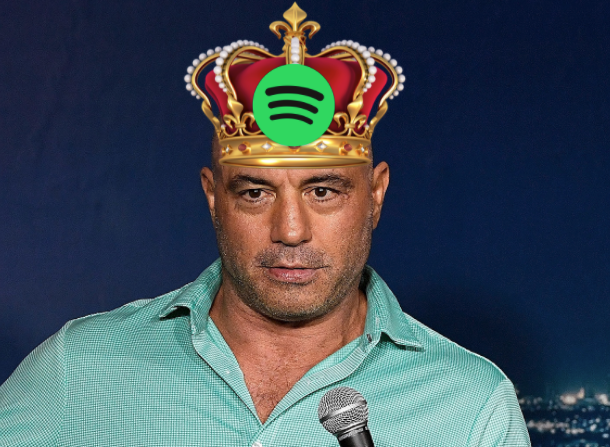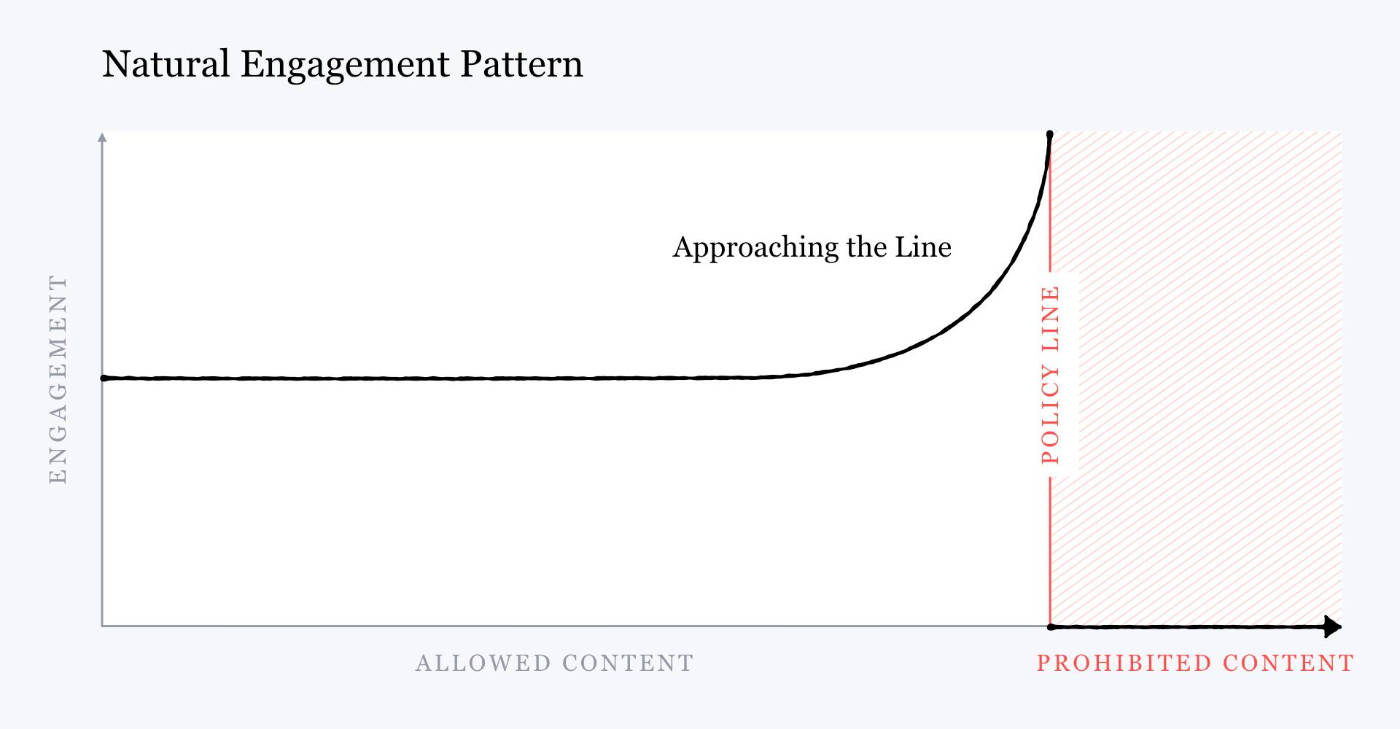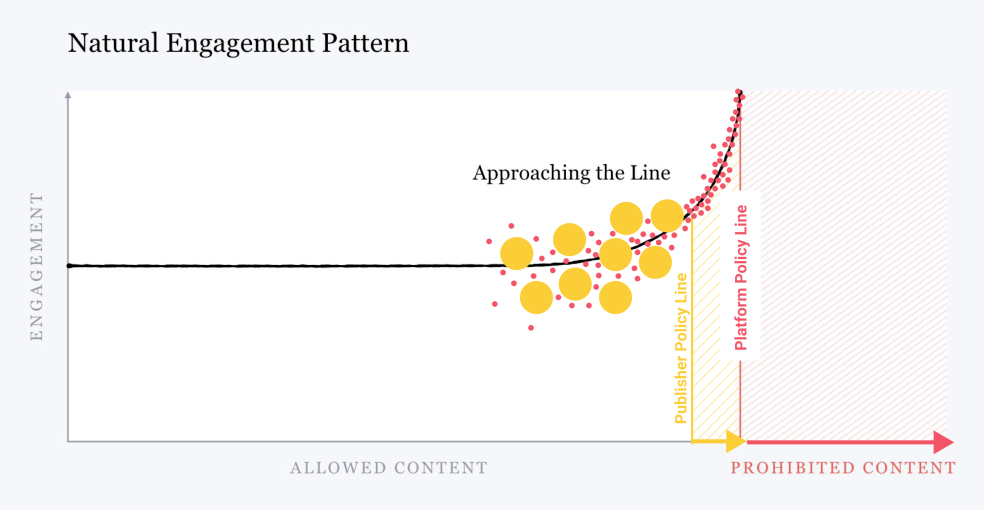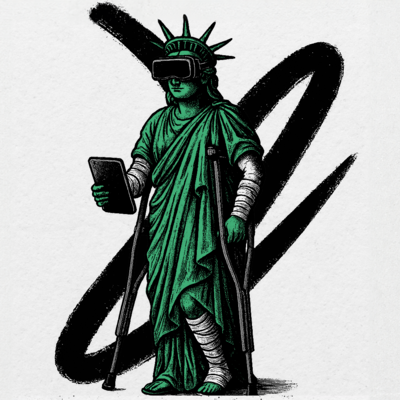
Sponsored By Axios HQ
Make your team's writing clear and smart with Axios HQ. It’s intuitive software that will help you and your team write in Axios’s smart brevity style designed to allow you to think more clearly, communicate more crisply, and send focused, effective updates.
Fortune 100s and startups alike use Axios HQ to craft smart updates that distill essential information in half the time. Writing is thinking, and Axios HQ can help you do both better:
As a narcissistic newsletter writer, there is no phrase that brings me more unadulterated joy to type than “I was right.”
Well, ladies and gentleman, I was right. Weirdly, I have Joe Rogan to thank for this.
In September of last year, I proposed a new method by which media companies should be evaluated: I call it Double-Bind Theory. Drawing on research performed by Facebook, I argued that consumer engagement skyrockets the closer you get to violating community standards. Crucially for today’s discussion, this happened regardless of where that line was drawn.
This theory is important because it shows why platforms will always beat publishers in the attention game. Companies like Spotify just have way, way more people producing content, meaning that the one person who drives maximum engagement will always rise to the top.
Red dots represent small amateur efforts, yellow dots represent large professional efforts.
Because it is easier to be a shameless individual than a shameless institution, it means that individuals can regularly beat traditional media companies at their own game. As I said in September:
“This results in a content Darwinism where the edgy thrive. The people who don’t create content that’s close to the line tend to either pivot towards the edge, go out of business, or hit an audience plateau earlier than they would have if they were more shameless.”
However, there is an extreme downside for platforms:
“No matter where you draw the line, your content moderation decisions will put you in a double-bind where you can't win. Double-Bind content theory is that the edgiest content will be the one that garners the most attention, however by virtue of it being edgy it will have negative social outcomes and thus negatively impact business outcomes.
The most popular content and creators will be flirting with the line, and you will experience pressure to let it slide by. If you stand firm, you risk losing them to more permissive platforms. You’ll also lose out on the revenue that the content would have generated. If you let their content go through, you risk having to testify in front of Congress (Facebook), or getting pressure to shut down by your banks (OnlyFans), or some other kind of repercussion.”
Joe Rogan is the living embodiment of my framework.
For those who somehow missed the recent debacle, Joe Rogan is the world’s most popular podcaster with reportedly 11M listeners for the average episode. His content has always flirted with the heretical (well, the heretical by the standards of the New York media crowd), playing host to anyone from conspiracy theorists to UFO enthusiasts. His brand of lovable, tough-guy, approachable stupidity allowed him to consistently flirt with the borders of content moderation lines over and over again.
Another major reason he got away with so much borderline (and over the line) content for so long is the difficulty in analyzing audio. The vast majority of content moderation technology has heretofore been devoted to text or picture analysis. Audio tech currently relies on transcribing audio to text and then running it through those same tech tools. However, transcription struggles with nuance and accuracy. Spotify isn’t alone in moderation issues here. Clubhouse, Discord, Twitter Spaces—all of them are currently sharing similar moderation problems.
Rogan’s tendency to play with fire finally caught up with him over the last few weeks. He got in trouble for maybe crossing the line by hosting anti-vaxxers on his podcast and in major trouble for definitely crossing the line by saying the N-word over 70 times in past episodes. As is typical of any internet debate, tribes formed, with many left-leaning voices bellowing out calls for deplatforming and right-wing pundits screaming about the threats of censorship. This is tough enough, but Spotify was put in an even more precarious position—Rogan’s exclusivity deal with Spotify is reportedly worth over $200M.
Note: I have opinions about what Rogan did and what should happen to him, but I think I’d rather just…keep them to myself? It is outside of the purview of Napkin Math to cast stones on this topic. I believe this is the first case of someone on the internet resisting the urge to vomit their opinions. Feel free to laud me for ascending to this moral high ground.
Spotify is keenly feeling the pain of the Double-Bind Theory. If they kick off Rogan, they’ll alienate a huge swath of fans and probably pay a breakup fee. If they keep him, they risk damaging their businesses due to backlash from detractors. There is no easy path out here. In short, I was right.
However, since writing that original post, there is one thing I was actually wrong about.
The Leveraged Individual
In my original thinking for Double-Bind Theory, I hypothesized that being on platforms was bad for creators too. In a talent marketplace stock full of millions of individuals, there is always someone to replace you. Since platforms aggregate attention, they can just adjust the eyeball canyon elsewhere. It would appear to be fairly simple.
And there are real world examples to back up this assumption. When Microsoft tried to compete against Amazon’s Twitch, they signed exclusive deals with the biggest stars in streaming. It went belly up within months—despite signing the biggest names, the audience didn’t follow.
Since that assertion, I’ve continued to meet more and more creators who have played the attention game for longer. At the point of writing that initial article, most of my colleagues were 1-3 years into this. But since then I’ve gone deeper, meeting with creators who are 6+ years in the game. What I found with these creators shifted my thinking about how powerful platforms truly are.
Note: Some of that research turned into the cover article for Utah Business Magazine if you want to read what I wrote about Mommy Bloggers.
There appears to be an inflection point, a moment where entrepreneurs shift from mere content creators to something more permanent. If people consume the fruit of your labor for long enough, the taste of it feels like home. There is a huge hesitation to forsake something that has been so important to you for so long. This is not a function of mere audience size! That is the mistake that Microsoft made. Instead, it is demonstrated by the emotional connection forged by steady consumption, a fastidious loyalty to a creator’s journey as much as what they create. I’ve started to see hints of it now that I’ve been writing online for nearly a year. When I first started publishing people would say “Great piece.” Now they talk about loving “my path.”
When this feeling of buy-in persists across an audience and hits some a level of critical mass, a creator becomes relatively platform-proof. They can shift their audience from medium to medium, site to site. Sure, they may get dinged as they lose their marginal fans from one platform and fail to pick up new fans on their new platform at the same rate. But once you have a big enough, loyal enough following, you move past the point where de-platforming is an existential risk.
For proof, look no further than the White House. Riot-inducer and former President Donald Trump was deplatformed by all major tech platforms over a year ago. His communication to the world was reduced to the occasional Fox News appearance and press releases sent to his email list. Despite that, when his new social media platform debuted on the App Store it shot to number one, and he’s polling roughly even with Biden right now for the 2024 Presidential campaign. The crazy part is, his app doesn’t even do anything yet! This is just the waitlist.
Note: I am currently at spot 489,395, but when I get to the top I’ll let you know how the app is lol.
Joe Rogan is likely also platform-proof. He has been making his podcast since 2009 and has reached that same critical mass. Let’s say Spotify did decide to kick him off. He could then go publish through RSS feeds to the rest of the podcasting platform like Apple. He could create TikTok snippets, YouTube highlights, and t-shirts to his heart's content. Good luck censoring that guy.
If someone doesn't like the current situation, there is only one choice: beat Rogan at his own game. That is the beauty of the internet, of creatorhood. If left-leaning individuals want to beat Joe Rogan, they should make a podcast that targets his same audience with a better product. Some of you may push back on this—our information system feels more broken than ever. Trabalization and polarization are so extreme that perhaps this market isn’t actually a competitive one. Going toe-to-toe with Rogan’s brand of rejecting traditional authority figures is difficult.
To which I respond, so what? If you want to win, if you want to beat a large incumbent, of course it isn’t going to be easy. Of course it isn’t going to be fair! But competing away services or products you don’t like is the only sure path to their annihilation.
Double-Bind Theory tells us that even if you got rid of Rogan, some other elk-eating dude will take his place, spouting similar views. Deplatforming Rogan won’t work because it isn’t solely his talent that makes him popular. It is his ability to push the content boundaries of acceptability. If your goal is to change his audience’s mind about something, you don’t shoot the messenger—the Double-Bind will just raise someone else in his place. Rather, you create something that helps his 11M-strong audience see things your way and also toes the content moderation line. The only way to compete with Rogan’s counter-cultural ideas is to directly acknowledge them, entertain them, and then disprove them in a relatable way. Convincing Rogan’s audience that your ideas are better than his will be the only way to create long-term change.
In the marketplace for ideas, better content is the sole path to victory.
The Only Subscription
You Need to
Stay at the
Edge of AI
The essential toolkit for those shaping the future
"This might be the best value you
can get from an AI subscription."
- Jay S.
Join 100,000+ leaders, builders, and innovators

Email address
Already have an account? Sign in
What is included in a subscription?
Daily insights from AI pioneers + early access to powerful AI tools












Comments
Don't have an account? Sign up!
The interesting thing is the two individuals that caused all the "anti-vaxxer" characterized hubbub for Rogan, aren't anti-vaxxers; this is where all the analysis including this article goes, in a biased fashion, sideways.
I'm fully vaccinated and have no dog in this fight...
McCullough and Malone are credentialed and simply present questions or other povs to accepted COVID wisdom. Yeah, they may be right or wrong on any given point. That's the point of democracy or a dialectic.
That this simple conclusion is lost in all analysis of the "Rogan thing" is beyond ignorant, from my pov. This is the double-blind.
The hysteria this Rogan thing caused, is hysterical. I don't even like Rogan, lol.
What I like even less, is the institutional, systemic myopia being imposed (and, no I'm not a right-winger and voted for the dog with the least fleas in Biden, lol)
Disclaimer: I do watch the Podcast (not every episode but some) so I'm also biased in as much as I like some of it. It's worth noting that the term Anti-Vaxxer has become a bit overloaded, it conjures an image of people who believe that a vaccine turns you magnetic and that Bill Gates puts tracking chips in them while what is discussed on the Podcast is vastly different to the point that I would consider that term used in bad faith.
I don't think Rogan keeps pushing the boundaries in the way you claim, it's really that the boundaries keep shifting on many platforms as moderation gets more and more aggressive. Spotify capitalized on this by signing Rogan before he was kicked off Youtube.
The major platforms are getting more extreme in their moderation even to the detriment of their revenue, likely because they want to avoid being regulated like media companies and retain the privilege of being a platform - even though I would say once they start having an editorial policy (not just removing illegal content, though on an international platform that can apply to a lot of things depending on the jurisdiction) they are in fact a media company.
I think your hypothesis hasn't accounted for the pressure to keep increasing moderation. This makes the bind worse.